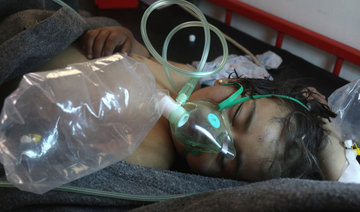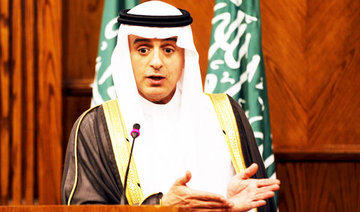JEDDAH: Saudi Arabia’s Deputy Crown Prince Mohammed bin Salman ruled out any dialogue with Iran because of Tehran’s overarching hegemonistic ambitions in the region.
In a wide-ranging interview with prominent Saudi host and journalist, Dawood Al-Shirian, which was aired Tuesday on national television, he said: “There is no common ground between us and Iran.”
He said Saudi Arabia had had a dialogue with Iran in the past when Iran had a relatively moderate leadership. According to the deputy crown prince, those efforts failed when the leadership in Tehran was replaced by hard-liners. “We realized they were not serious about holding dialogue,” he said.
He recalled a popular saying of Prophet Muhammad (peace be upon him) that a Muslim cannot be fooled twice.
The deputy crown prince pointed out that there was an inherent problem with Iran’s ideology that prevents it from being a good neighbor.
“Iran believes that before Imam Mahdi reappears, it must prepare a fertile ground for him and that it must control the Muslim world,” he said, referring to the Shiite belief that Imam Mahdi — the 12th and last Shiite imam who disappeared in the 9th century — will one day appear in order to bring justice to earth.
“How can I come to an understanding with this?” said the deputy crown prince. “How can you have a dialogue with them against this background?” he asked. “Iran’s goal is to gain control of the Two Holy Mosques.”
War in Yemen
Stating that no one wanted the conflict in Yemen to continue forever, Prince Mohammed said the war there became necessary and unavoidable in order to protect the legitimacy of the internationally-recognized government led by Abed Rabbo Mansour Hadi.
“Saudi Arabia had to become involved because of the threat the Houthi militia posed to our national security,” he said.
“We can crush the Houthis and (Ali Abdullah) Saleh within days but this would be at a very heavy price. We do not want to see thousands of our soldiers lose their lives. We are not in a rush. Time is in our favor. We have all the needed logistics, unlike our enemy who has no reinforcements or supplies and his morale is sagging,” he said, while pointing out that Saleh and the Houthis have major differences and that the former is under the protection of the latter.
“We did not want to go to war, but it came to a point where we either got involved or were faced with a worse scenario. We had a very negative experience with the Houthi militia in 2009 when they posed a threat to international maritime trade. If we had waited longer, we would have seen the battle transferred to Saudi territory,” he explained.
The deputy crown prince said in the beginning there was an attempt to initiate a political dialogue in order to avoid war. There had been open channels of communication with Saleh and the Houthis. It was agreed that they should not attack Aden because, if that happened, it would complicate the whole process of political dialogue. The Houthis continued to expand all over the country. And so, unfortunately, those efforts failed and we had to go to war,” he said.
He said he had met recently with Yemeni tribal leaders in Riyadh “and they expressed their absolute rejection of the Houthis.”
According to the deputy crown prince, the Saudi-led Arab coalition now has the upper hand. “Before our involvement in Yemen, the legitimate government’s control was zero. With support from the Arab coalition, the legitimate government now controls more than 80 percent of the country.”
The crisis in Syria
He described the situation in Syria as very complicated and blamed former US President Barack Obama for wasting many opportunities to resolve it.
“Today there is an involvement of other major players, including Russia ... Escalated tensions between major powers in Syria could lead to international crisis,” he said.
The deputy crown prince said Saudi Arabia’s ties with Egypt remained solid despite a negative campaign in some media outlets. “The Muslim Brotherhood-affiliated media outlets in Egypt tried to sour the ties between our two countries but our ties are very strong. No negative stance has been taken by either side against the other. Rumors are being spread by the enemies of our two countries. We pay no attention to them.”
On the controversy about the ownership of the two islands of Tiran and Sanafir, he said: “No country was asked to give up any territory. We only signed a demarcation agreement. According to documents the Saudi and Egyptian government have, as well as to international records, the islands are clearly Saudi territory. The demarcation was carried out because of the economic benefits the two countries will enjoy as a result.”
He said the construction of a bridge that will link Saudi Arabia to Egypt would begin by 2020.
He said 13 percent of international maritime traffic, carrying GCC imports and exports, passes through the Red Sea and that Saudi Arabia provides zero services. “We aim to leverage this in our favor by establishing hubs at our ports on the Red Sea.”
“The planned bridge between Saudi Arabia and Egypt can provide an alternative route for imports and exports,” he added.
Zero tolerance for corruption
He said since the accession of King Salman to the throne, there has been zero tolerance for corruption.
“King Salman made changes to the National Anti-Corruption Commission (Nazaha) on Day 1,” he said, and reiterated that “no one involved in any corruption case will be spared from accountability, whether they be a minister, a prince or anyone else.”
He called on anyone with documents related to any suspected corruption case to hand them over to the authorities.
The deputy crown prince said many achievements had taken place since Saudi Vision 2030 was launched a year ago. “Any plan for reform comes with some side effects,” he said.
Saudi Arabia’s non-oil income has doubled in the past couple of years.
“We think there are huge non-oil investment opportunities in the Kingdom which have not yet been utilized.”
“The Public Investment Fund (PIF) invests mainly in mining. We believe there are huge non-oil investment opportunities in the Kingdom which have not been used. The Aramco IPO will provide cash for the PIF.”
“When the salary allowances in the public sector were suspended, it was initially a temporary decision,” he said. “Now that oil revenues have improved, the decision was looked at again.”
He said that more than a million housing units will be offered to citizens at affordable prices. “We expect those housing units to be ready and open in the third quarter of 2017.”
No income tax
“There will be no taxes imposed on the commercial sector nor any taxes on income,” he said.
He said the state’s role is to guarantee free medical coverage for all citizens. “Privatization of the health care sector is the norm all over the world,” he said. “It will be clear by the end of the year how to proceed with privatizing the health sector.”
Prince Mohammed said the factors in reducing the budget by 44 percent deficit were the OPEC accord to reduce oil production and the increase in non-oil revenues. He also said the returns from the Public Investments Fund had received “tens of billions” of riyals per annum since 2015.
Vision 2030
The prince outlined Vision 2030 as a three-tiered plan with the first phase running through 2020, the second until 2025 and the final phase through 2030.
He described them as executive programs carrying clear-cut means and goals to achieve the vision. But he also said the government is feeling pressure to launch the initiatives. “We don’t want to be delayed,” he said.
The interview follows the announcement earlier this week of 10 remaining programs, extensions of the original plans to be implemented for the 2020 program.
Vision 2030 was launched in 2016 after the Saudi government announced in December 2015 that it had a $98 billion budget deficit due largely to plummeting oil prices. The program is an aggressive effort to reduce the deficit by weaning the nation from its dependence on oil revenue and focus on non-oil revenue such as promoting tourism, developing a favorable environment for entertainment venues and creating more jobs for Saudi women. However, the government first took the drastic step of slashing allowances of public employees, which affected some salaries of government workers of up to a 40 percent reduction.
Jobs for Saudis
He said private investments is a key to recovery and will help provide jobs for Saudis. He said the 10 new programs will “cover various expenditures ranging form investment to the private sector, and strongly and mainly stimulating job creation in the coming few years.
“As everybody knows, the goal of Vision 2030 is to reach a 7 percent unemployment (rate) in the Kingdom of Saudi Arabia,” Prince Mohammed said: “These programs will, no doubt, push us to a better international classification in 2020 than we are today.”
He noted the allowance cuts in salaries for public servants was temporary and subject to periodic review. He said the cuts were necessary to offset the reduction of oil prices and a “pessimistic scenario” of oil prices at $45 per barrel and “optimistic scenario” of $55 per barrel.
“Accordingly, we were adjusting our securities to different oil prices,” he said. “During the first quarter of 2017, we were close to optimistic scenario, which is $55, sometimes over, sometimes a bit less. This is a positive element.”
Positive development
Prince Mohammed said another “positive” development was that non-oil revenue in the first quarter of 2017 exceeded expectations, “nullifying the decision to deprive the public from their allowances.”
He added the “overall issue is considered a great job done by authorities in the financial and economic, investment fields who accomplished it in just eight months.
He said the cuts in allowances “no doubt” helped reduced the budget deficit. He denied the contention from Western business analysts that the restoration of allowances was a setback and the result of public pressure.
“That’s not true,” he said. “The deficit has decreased, in the first quarter by 44 percent. This is sufficient to prove that we are right. The budget deficit is decreasing than what we envisioned, then why should we keep adopting austere measurements?”
Generally, business and finance analysts applaud Saudi Arabia’s Vision 2030 primarily because the government is attempting to privatize some sections of the public sector and to open the Kingdom to private investment.






























